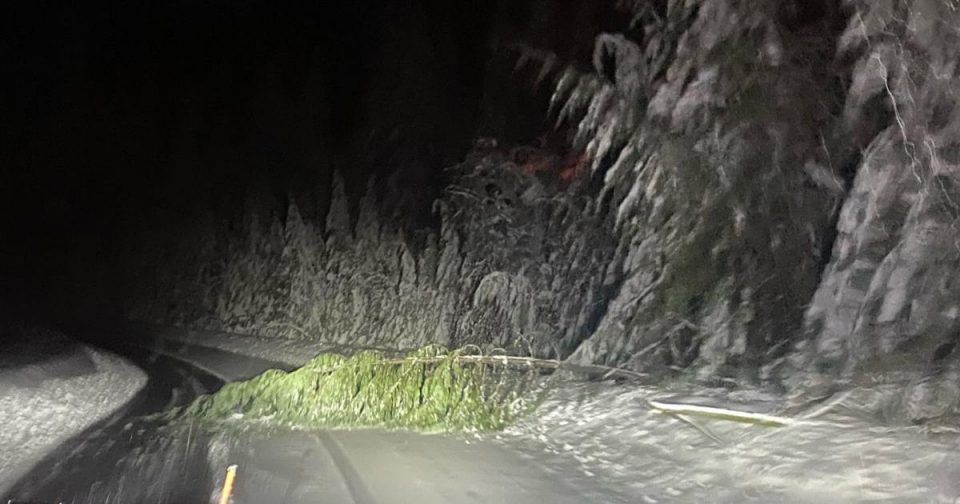People hoping to drive between the west and east sides of Washington state are stuck with canceled plans until Friday or Saturday at the earliest, after a blizzard Thursday — followed by freezing rain, then more snow — closed Snoqualmie, Stevens, White and Blewett passes.
The pass closures will delay freight moving along the region’s already strained supply chain, while ravaging the plans of New Year’s week travelers, perhaps heading back to homes and colleges. Alpine resorts are blanketed in snow without the means for skiers to arrive.
It’s been almost three years since a severe 47-hour snow shutdown at Snoqualmie Pass on Feb. 11, 2019, when a burst of four feet of snow in two days brought avalanche risks.
But it’s unusual — and maybe unprecedented — to close all four passes simultaneously for more than a few hours.
White Pass rarely closes but is under extreme avalanche risk Thursday, said Summer Derrey, regional spokesperson for the Washington State Department of Transportation. A section of Highway 12 through the pass collapsed in a late-2015 washout and another in fall 2013, reducing travel to one lane during reconstruction.
“Exporters from eastern Washington and beyond are not able to get their cargo to Northwest Seaport Alliance terminals” at Seattle and Tacoma, said Peter McGraw, a Seattle port spokesperson.
The city of Cle Elum, east of Snoqualmie Pass, declared an emergency based on “an unprecedented amount of snow,” encouraging residents to stay off the roads.
Snoqualmie Pass, the lowest of the four passes at 3,022 feet above sea level, received 236 inches this season as of Jan. 3, the most in 20 years.
WSDOT said trees are falling and avalanches could cover I-90 at any moment. The road-clearing team can perform limited plowing and tree removal but aren’t venturing far, Derrey said.
Normally there are about 20 people per shift, minus “a couple” under COVID quarantines this week, she said. Some road workers quit last fall rather than obey the governor’s vaccine mandate. But the immediate problem isn’t workforce, but extreme precipitation.
“We’re kind of on pause,” Derrey said midday Thursday. “It’s too dangerous even for our avalanche crews to get in and do assessments.” State officials said heavy snowfall and near-zero visibility have overwhelmed their crews.
The National Weather Service reports visibility of only a quarter-mile Thursday morning in heavy snow at Snoqualmie Pass. Forecasts call for rain later Thursday, followed by six inches to another foot of snow there on Friday and Saturday before the sun appears Sunday.
I-90’s shutdown affects not only the summit, but a full 72 miles between North Bend and Ellensburg. A resident at Snoqualmie Pass tweeted her thanks to officials who notified neighbors of the coming storm, so they had time to buy groceries and supplies.
After the Thursday blizzards, weather forecasts call for heavy rain, which could freeze or create a dangerous layer over the softer snow. WSDOT says rainfall “will increase the avalanche issues.”
After the weather calms, state crews will need several hours to cut away downed trees, perform avalanche control work such as bombarding snow with explosives, and clearing icicles from overhead signs. WSDOT has even used World War II cannons to blast unstable snow, but it’s unclear whether they’re available and practical this week.
Ski resorts at White Pass, Crystal Mountain, The Summit at Snoqualmie including Alpental, and Stevens Pass said they’re closed. It’s the latest snafu in a ski season marked by bumpy schedules, as Crystal Mountain has gone back and forth on reservations, and Stevens Pass is beleaguered by customer complaints about staffing. Fallen trees blocked Highway 410 near Crystal, resort staff announced.
At I-90’s Exit 34 near North Bend, a pair of state troopers blocked the eastbound freeway. About 30 truckers parked on the shoulder, along with others in the nearby truck stop, but few cars appeared by late Thursday morning, as WSDOT’s widespread messaging led travelers to turn around sooner, or to stay home.
Despite snow and ice east of the mountains and some slowdowns, I-82 and I-90 remained open east of Ellensburg, with chains required in some steep areas.
Information from photographer Amanda Snyder and assistant features editor Trevor Lenzmeier is included in this article.


